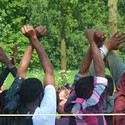Inter Press Service English, English (3 juli 2012)
Going Dutch Means Staying Stuck
 Many asylum seekers are being denied refugee status by the Dutch authorities, but cannot go back to their own country either. Forced removals are doing little to better the situation.
Many asylum seekers are being denied refugee status by the Dutch authorities, but cannot go back to their own country either. Forced removals are doing little to better the situation.
- Lees ook: Uw lichaam spreekt boekdelen (Trouw)
Frank and Johannes Mulder
In the last few months groups of asylum seekers have set up different protest camps to draw attention to their situation. A camp in May continued for two weeks, until it was cleared by the authorities, declaring health and safety considerations.
The nearly 400 participants were mainly from Iraq and Somalia, but also from Iran, Afghanistan, Eritrea, Ethiopia and Sudan. They were offered the choice to leave the place voluntarily or to be sent to a asylum seekers centre again, temporarily.
Some of the Iraqis accepted to go to a centre voluntarily, because minister for integration Gerd Leers promised a decision by September, when he meets his Iraqi colleague in Baghdad.
"We know the Dutch minister will do everything he can to send us back," said Hadi Abu Sanad, a spokesperson for the Iraqi protesters. "But we also know the Iraqi government will stick to its view that no one can be forced to be sent back to Iraq. And we will never sign voluntarily to return to our country."
"Going to Iraq feels like deportation," said Mustafa (not his real name), an Iraqi in his early thirties, who speaks Dutch perfectly. "I've been living here since I was a teenager. I am married to a Dutch woman, we have a child and we expect a second one. I have no place to go in Iraq and no reason to live there."
Seyed (not his real name), an Iranian, is without hope. He finished the refugee procedure a year ago, without success. "I became a Christian in Iran and that created many problems for me. Everything is impossible for me there. I have been supported by a church for some months, but what can I do know? I don't know. I have no future here because the government doesn't believe I'm a Christian."
Choosing between the street and a refugee centre is no choice, said Sam Saeed, spokesperson for the Somalis in the protest camp. "We've been there 3, 4 or 5 times, and each time we're sent away. We want a decision instead."
The core of the problem is the so-called 'return policy' which is not realistic, said Anne-Els Jansen from Vluchtelingenwerk, the Dutch Council for Refugees.
"Many people who fail to get a permit are real refugees, who fear for their lives in their own country. They'll never go back. Moreover, many people have been accepted temporarily, because their country was considered too dangerous.
“This was the case for many of the Iraqis in the protest camp. Their permit was not extended because the country is considered safe now. But some regions are still very dangerous. Every month 300 or 400 civilians die."
When asylum seekers are officially denied refugee status, but don't want to return voluntarily, they are simply in effect thrown out of the official asylum seekers centre.
"They are accompanied to the gate, sent to the street," Jansen said. "But even people who do cooperate to return are often left on their own, for example because they can't prove who they are or because their country is in war.
“That's the problem of the Somalis in the protest camp. The authorities haven't succeeded in sending one Somali back to their country, as a result of the civil war. It's a scandal how the government treats them. They believe it's the individual responsibility of the refugee to go back, but that's impossible."
Each year around 5,000 asylum seekers are "left with unknown destination", as they are officially called. It's not clear how many of them remain in the Netherlands. Many of them are arrested and detained now and then when the police finds them, but usually they are released after weeks or months if deportation is still impossible.
This year the right-wing government has introduced a law to criminalise such so-called illegality. When someone has been ordered to leave the country, he is not allowed to be there any more. As a result, people who are found without a passport can be fined or imprisoned.
"The return policy is unrealistic and leads to hopeless people without any perspective," Jansen said. "Everything is left to the individual. But many can't even try to return, or to travel to another country, because they don't have papers. They are literally stuck."
Gerelateerde artikelen
- Nederland volledig vegan: het kán (De Groene Amsterdammer)
- Docu: Vlucht uit Noord-Korea (VPRO Gids)
- Verstrikt in het Servische moeras (De Groene Amsterdammer)
- Poor People Don’t Need Help (overig, English)
- Het goede nieuws van een gemeenschap (overig)
Gebruikte Tags: recht, vluchtelingen

